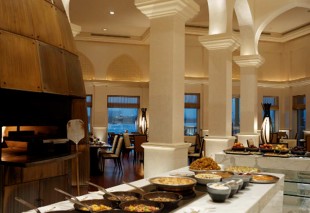F&B executives from three major hotel chains said their luxury iftars were not a significant cause of large increases in the amount of food wasted in the emirates during Ramadan.
Around 1850 tonnes of food were thrown out on average per day in Dubai during Ramadan in 2010, roughly 20% of total waste in the emirate during the holy month, according to Dubai Municipality.
In Abu Dhabi, at least 500 tonnes of food were thrown out on a daily basis during the month, The National reported in August last year.

| Advertisement |
While many of the UAE’s luxury hotels offer lavish buffets, they claim food waste produced does not significantly increase during the holy month.
“We cook according to the bookings we receive so there is very little waste. Some leftovers are given to colleagues in the hotel for their iftar,” Bab Al Shams Desert Resort & Spa Monal Malhotra told Hotelier.
“Our live cooking stations are also a good way to control the amount of waste as you cook in line with demand.”
Similarly, Hilton Dubai Jumeirah executive chef Steven Benson Flower said advanced bookings gave some indication of how much food to prepare and any fit leftovers may be taken to the team dining room.
“We haven't found the amount of food waste to increase during Ramadan,” Flower said.
The amount of food produced for iftars is counteracted by the reduced amount produced in the main restaurant buffet, he went on to explain.
Patricia Ghamami, manager of food and beverage operations at Fairmont Bab Al Bahr in Abu Dhabi, said the hotel went one step further using “menu engineering” to calculate how much food will be consumed per person, per food item.
“You can almost calculate the exact amount of food that will be consumed per person on average. The technique is based on past experience and international eating trends, and can be relied on,” she said.
Ghamami also stressed the importance of adhering to food safety regulations when giving leftovers to colleagues, warning that food presented on a buffet at one meal time could not be laid out at a later meal time.









 Search our database of more than 2,700 industry companies
Search our database of more than 2,700 industry companies










Aug 21, 2011 , India
Only certain percentages of the invitees for Iftar are fasting. Rests come there for networking and also try finger food before they go home for actual dinner in their own style. I lived in the Gulf for 34 years and know how food is wasted during Iftar and other functions. Please remember food is...
Aug 19, 2011 , USA
1,850 TONS of food A DAY!!! You need to completely change the way you do things. I say put all food in a buffet line where servers place ONLY one serving of each food the customer wants on their plates. Tell them they can always come back to the buffet line for second or even third helpings. Thi...